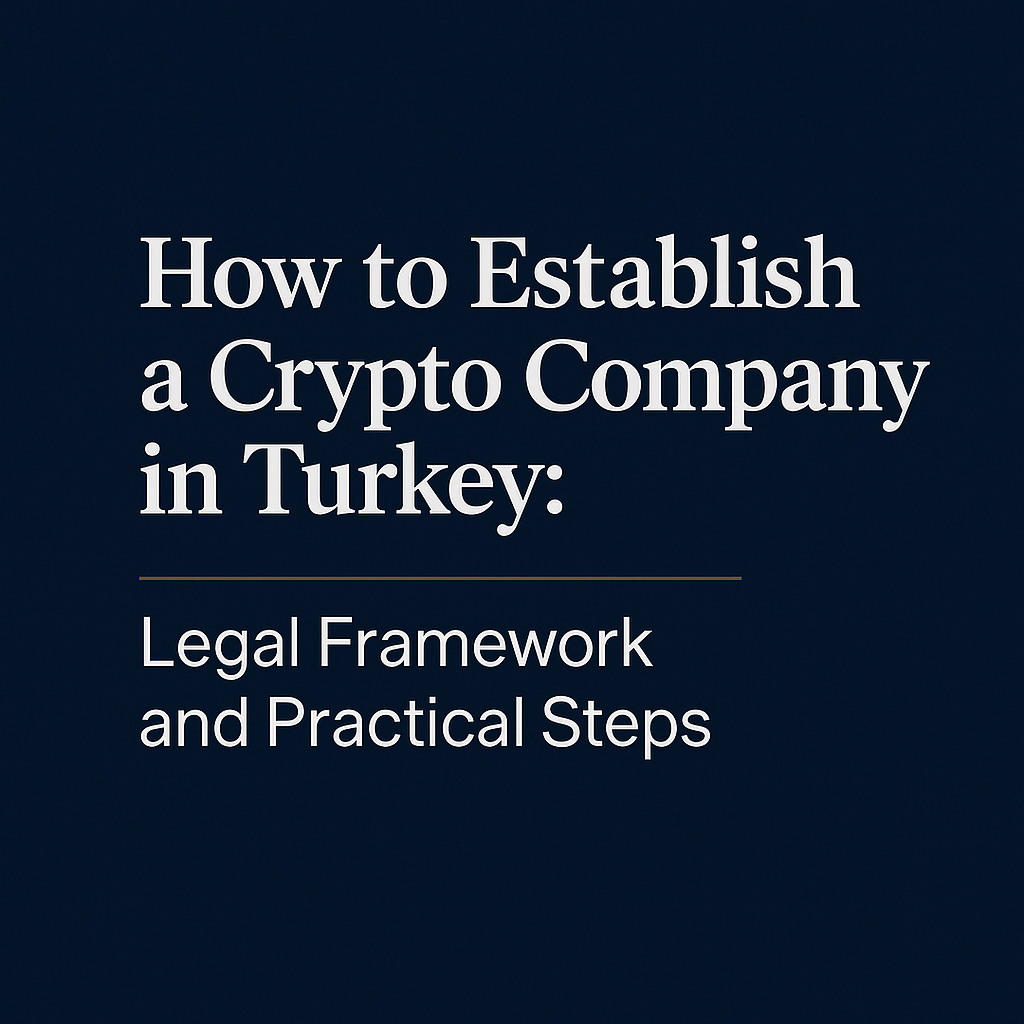Introduction
Türkiye has rapidly become a hub for blockchain and cryptocurrency innovation, attracting both local entrepreneurs and foreign investors. The country’s dynamic tech environment, young population, and increasing crypto adoption rates make it an attractive destination for establishing a crypto business. However, the legal landscape remains complex, evolving, and often misunderstood, posing unique challenges for anyone looking to launch a crypto company in Türkiye. This article offers a clear, step-by-step guide for CEOs, founders, and investors who want to navigate the legal framework and practical steps of setting up a crypto business in Türkiye.
1. Understanding the Legal Status of Cryptocurrencies in Türkiye
- Current Regulatory Environment:
As of 2025, cryptocurrencies are not recognized as legal tender in Türkiye, but crypto trading and holding are not prohibited. The Central Bank of Türkiye (CBRT) and the Financial Crimes Investigation Board (MASAK) regulate aspects of crypto transactions, especially concerning payments and anti-money laundering (AML). - Ongoing Legislative Developments:
Türkiye’s parliament continues to debate comprehensive crypto regulation, including a draft law to create a formal licensing regime for crypto service providers. Therefore, businesses should anticipate regulatory changes and operate with compliance-first mindsets.
2. Choosing the Right Legal Entity for Your Crypto Business
- Common Structures:
The most popular company types are Limited Liability Company (Ltd. Şti.) and Joint Stock Company (A.Ş.). For foreign investors, both structures are available, and 100% foreign ownership is permitted. - Advantages:
- Ltd. Şti.: Lower capital requirements, simpler governance, faster setup.
- A.Ş.: Suitable for larger ventures (crypto exchanges, custody providers), easier to attract investment, can issue shares, better credibility with partners and banks.
- Share Capital:
- Ltd. Şti.: Minimum TRY 10,000 (around $300).
- A.Ş.: Minimum TRY 50,000 (around $1,500).
3. Company Incorporation Procedure: Step-by-Step
a) Prepare Documentation
- Founders’ passports/IDs and notarized translations
- Turkish tax numbers for foreign shareholders
- Articles of Association (tailored to crypto activity)
- Lease contract for office address in Türkiye
b) Register the Company
- Apply via MERSIS (Central Registration System)
- Notarize signatures and Articles of Association
- Deposit minimum capital in a Turkish bank account
- Register with the local Trade Registry Office
c) Obtain Tax and Social Security Registration
- Apply for a tax number at the local tax office
- Register with Social Security Institution (SGK) if hiring employees
d) Open a Corporate Bank Account
- Turkish banks have strict due diligence, especially for crypto businesses—expect enhanced scrutiny and possible rejections
4. Regulatory Compliance: MASAK and AML Obligations
- Registration as a Crypto Service Provider:
Although not yet subject to a full licensing regime, all crypto asset service providers must notify and comply with MASAK’s AML and CTF (counter-terrorism financing) obligations. - KYC and Customer Due Diligence:
Companies must implement KYC, customer due diligence, and suspicious transaction reporting, mirroring standards found in the EU and FATF guidelines. - Record-Keeping:
All crypto transactions, user IDs, and related documents must be stored for at least 8 years.
5. Opening a Bank Account: Practical Challenges
- Reality Check:
Most Turkish banks are cautious or even reluctant to open accounts for crypto-related companies, even if legally incorporated. - Tips for Success:
- Prepare extensive compliance documentation (business plan, source of funds, risk assessments)
- Use established legal and consulting partners
- Focus on banks with fintech or crypto experience (private and participation banks may be more open)
- Be transparent with the bank’s compliance department
6. Taxation of Crypto Companies
- Corporate Tax:
Crypto companies are subject to the standard corporate tax rate (currently 25%). - VAT:
The application of VAT on crypto transactions remains legally ambiguous; consult a tax professional for updated guidance. - Withholding Tax & Payroll Tax:
Standard tax rules apply for employee salaries and dividends.
7. Foreign Ownership and International Transactions
- No Restriction:
Foreigners can own 100% of Turkish crypto companies, and company shares can be transferred abroad. - Cross-Border Payments:
Sending and receiving crypto payments internationally is generally allowed, but banks will require additional documentation and justification for large flows.
8. Key Legal Risks and Ongoing Obligations
- Regulatory Changes:
New crypto laws are expected—be ready to update policies and obtain possible licenses in the near future. - Data Protection:
Compliance with KVKK (Türkiye’s Personal Data Protection Law) is mandatory, especially for user onboarding and storage of sensitive information. - Potential Sanctions:
Non-compliance with MASAK rules can result in severe fines, business closure, or even criminal liability.
9. Practical Recommendations for CEOs and Investors
- Stay Informed:
Engage a local legal team with crypto expertise; monitor legislative developments. - Implement Strong Compliance:
Create robust AML/KYC programs from day one. - Banking Strategy:
Approach several banks, prepare for possible delays, and use compliance-friendly partners. - Insurance:
Consider insurance products for cyber, theft, and operational risks. - Document Everything:
Ensure contracts, user agreements, and internal policies are well drafted and legally compliant.
10. Conclusion
Establishing a crypto company in Türkiye offers significant opportunities, but also unique regulatory and operational challenges. Success in this sector requires not only a strong business model but also a proactive approach to compliance, risk management, and adaptation to legal changes. By understanding the legal framework and following practical steps, foreign and local entrepreneurs can take advantage of Türkiye’s dynamic crypto environment and build a successful, compliant, and scalable business. In the process, working with an expert lawyer would be a good way to understand the legal framework.
Stj.Öğr.Esmanur AKTAŞ

Yanıt yok